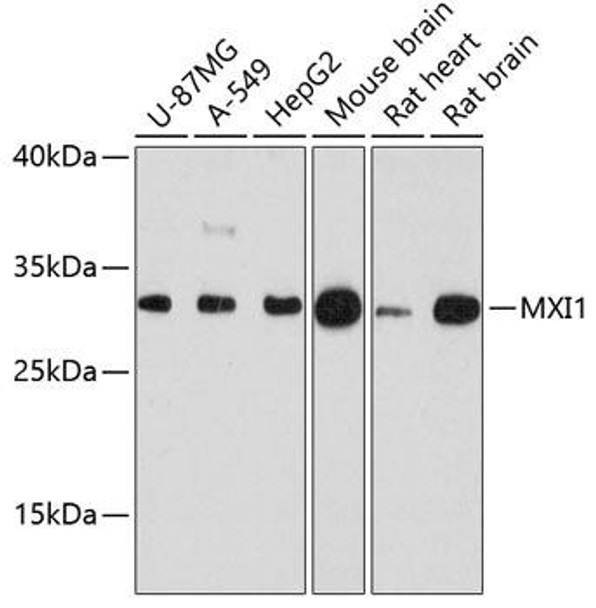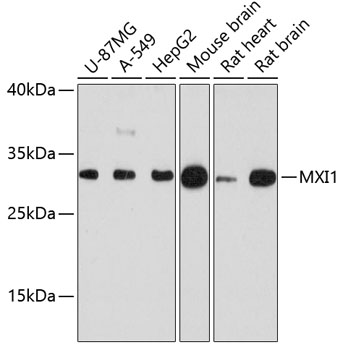Anti-MXI1 Antibody (CAB12098)
- SKU:
- CAB12098
- Product type:
- Antibody
- Reactivity:
- Human
- Mouse
- Rat
- Host Species:
- Rabbit
- Isotype:
- IgG
- Antibody Type:
- Polyclonal Antibody
- Research Area:
- Epigenetics and Nuclear Signaling
Frequently bought together:
Description
| Antibody Name: | Anti-MXI1 Antibody |
| Antibody SKU: | CAB12098 |
| Antibody Size: | 20uL, 50uL, 100uL |
| Application: | WB |
| Reactivity: | Human, Mouse, Rat |
| Host Species: | Rabbit |
| Immunogen: | Recombinant fusion protein containing a sequence corresponding to amino acids 170-295 of human MXI1 (NP_569157.2). |
| Application: | WB |
| Recommended Dilution: | WB 1:500 - 1:2000 |
| Reactivity: | Human, Mouse, Rat |
| Positive Samples: | U-87MG, A-549, HepG2, Mouse brain, Rat heart, Rat brain |
| Immunogen: | Recombinant fusion protein containing a sequence corresponding to amino acids 170-295 of human MXI1 (NP_569157.2). |
| Purification Method: | Affinity purification |
| Storage Buffer: | Store at -20°C. Avoid freeze / thaw cycles. Buffer: PBS with 0.02% sodium azide, 50% glycerol, pH7.3. |
| Isotype: | IgG |
| Sequence: | HTTL GLLN KAKA HIKK LEEA ERKS QHQL ENLE REQR FLKW RLEQ LQGP QEME RIRM DSIG STIS SDRS DSER EEIE VDVE STEF SHGE VDNI STTS ISDI DDHS SLPS IGSD EGYS SASV KLSF TS |
| Gene ID: | 4601 |
| Uniprot: | P50539 |
| Cellular Location: | Nucleus |
| Calculated MW: | 20kDa/21kDa/26kDa/32kDa |
| Observed MW: | 26kDa |
| Synonyms: | MXI1, MAD2, MXD2, MXI, bHLHc11 |
| Background: | Expression of the c-myc gene, which produces an oncogenic transcription factor, is tightly regulated in normal cells but is frequently deregulated in human cancers. The protein encoded by this gene is a transcriptional repressor thought to negatively regulate MYC function, and is therefore a potential tumor suppressor. This protein inhibits the transcriptional activity of MYC by competing for MAX, another basic helix-loop-helix protein that binds to MYC and is required for its function. Defects in this gene are frequently found in patients with prostate tumors. Three alternatively spliced transcripts encoding different isoforms have been described. Additional alternatively spliced transcripts may exist but the products of these transcripts have not been verified experimentally. |
| UniProt Protein Function: | Mad2: Transcriptional repressor. MXI1 binds with MAX to form a sequence-specific DNA-binding protein complex which recognizes the core sequence 5'-CAC[GA]TG-3'. MXI1 thus antagonizes MYC transcriptional activity by competing for MAX. Defects in MXI1 may be a cause of susceptibility to prostate cancer (PC). It is a malignancy originating in tissues of the prostate. Most prostate cancers are adenocarcinomas that develop in the acini of the prostatic ducts. Other rare histopathologic types of prostate cancer that occur in approximately 5% of patients include small cell carcinoma, mucinous carcinoma, prostatic ductal carcinoma, transitional cell carcinoma, squamous cell carcinoma, basal cell carcinoma, adenoid cystic carcinoma (basaloid), signet-ring cell carcinoma and neuroendocrine carcinoma. 4 isoforms of the human protein are produced by alternative splicing. |
| UniProt Protein Details: | Protein type:DNA-binding; Oncoprotein Chromosomal Location of Human Ortholog: 10q24-q25 Cellular Component: cytoplasm; nucleolus; nucleus Molecular Function:protein binding; transcription corepressor activity Biological Process: cytoplasmic sequestering of transcription factor; negative regulation of cell proliferation Disease: Prostate Cancer |
| NCBI Summary: | Expression of the c-myc gene, which produces an oncogenic transcription factor, is tightly regulated in normal cells but is frequently deregulated in human cancers. The protein encoded by this gene is a transcriptional repressor thought to negatively regulate MYC function, and is therefore a potential tumor suppressor. This protein inhibits the transcriptional activity of MYC by competing for MAX, another basic helix-loop-helix protein that binds to MYC and is required for its function. Defects in this gene are frequently found in patients with prostate tumors. Three alternatively spliced transcripts encoding different isoforms have been described. Additional alternatively spliced transcripts may exist but the products of these transcripts have not been verified experimentally. [provided by RefSeq, Jul 2008] |
| UniProt Code: | P50539 |
| NCBI GenInfo Identifier: | 116242666 |
| NCBI Gene ID: | 4601 |
| NCBI Accession: | P50539.2 |
| UniProt Secondary Accession: | P50539,Q15887, Q6FHW2, Q96E53, B1ANN7, D3DR25, D3DRA9 |
| UniProt Related Accession: | P50539 |
| Molecular Weight: | 20,558 Da |
| NCBI Full Name: | Max-interacting protein 1 |
| NCBI Synonym Full Names: | MAX interactor 1, dimerization protein |
| NCBI Official Symbol: | MXI1 |
| NCBI Official Synonym Symbols: | MXI; MAD2; MXD2; bHLHc11 |
| NCBI Protein Information: | max-interacting protein 1 |
| UniProt Protein Name: | Max-interacting protein 1 |
| UniProt Synonym Protein Names: | Class C basic helix-loop-helix protein 11; bHLHc11 |
| Protein Family: | Max-interacting protein |
| UniProt Gene Name: | MXI1 |
| UniProt Entry Name: | MXI1_HUMAN |






